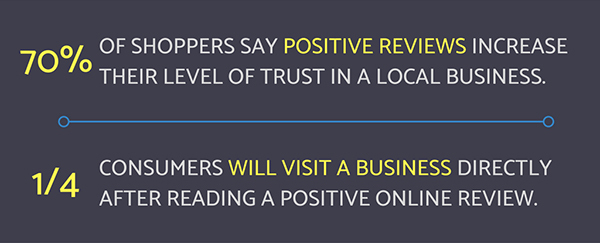CX Tech Top-Ups: Protect Your Image with Reputation Management
We’re thrilled to introduce Reputation Management, a new tool designed to help businesses actively manage their online presence. In a world where 7...

It’s no secret that the opinions of customers shared through online reviews and ratings have a large influence on a brand’s reputation and play a critical role in a company’s success. In fact, 92% of consumers check online reviews before making a purchase. However, while a brand’s reputation may be formed online, the effects are far-reaching and extend into the physical world.
In this blog, we'll discuss what reputation management is, why it's important, and how multi-location businesses can proactively manage their online presence.
A brand’s online reputation can be their greatest asset, but it can also be a liability. Reputation management is actively monitoring, influencing, and managing the way a brand is perceived online across a variety of sources including news sites, blogs, review sites, and social media.
There are many compelling reasons for businesses to build and maintain a consistent and positive presence online:
 The good news is many tools make it easier for companies to listen to and manage what’s being said about their business online. Social media monitoring software tracks a business’s name (or variations of that name), products, key employees, and even relevant keywords for mentions across the web, allowing business to receive alerts and respond to feedback in real-time.
The good news is many tools make it easier for companies to listen to and manage what’s being said about their business online. Social media monitoring software tracks a business’s name (or variations of that name), products, key employees, and even relevant keywords for mentions across the web, allowing business to receive alerts and respond to feedback in real-time.
Whether you’re actively listening or not, people are talking about your brand online. While you can’t stop consumers from posting negative reviews or sharing a poor customer experience, you can control how and when you respond to that feedback.
Multi-location business like Wawa and AccorHotels have built their brands on a global scale yet maintain a consistent brand reputation across all of their locations. It’s important for consumers to feel they can enter any location across the U.S and receive that same consistent, delightful experience.
One way to connect with local shoppers is to establish individual social media pages for each location. Consumers want to engage with their local businesses, in fact, 85% of social media consumer engagements with a brand take place on local pages and only 15% on corporate pages. That’s a pretty staggering figure, but it makes a lot of sense when you consider that customers interact with location pages when they’re looking for quick answers to their questions, versus a corporate message.
Of course, individual location pages should deliver a clear and consistent message. Differing opinions on every location page may tarnish a brands reputation, confuse customers, and even make them uncertain about the experience they are going to receive.
According to Think with Google, 50% of location mobile searchers call or visit a business location within 24 hours of their search. That’s why it’s so important that multi-location brands have the systems and processes in place to both listen and respond, to reviews from individual locations.
The concept of reputation management isn’t new to multi-location businesses, but in today’s connected world, it’s time to move beyond just reacting to poor reviews, and wherever possible, taking steps to proactively reduce them.
While it’s important for businesses to maintain a positive reputation at the location level, a consistent customer experience across all locations is what differentiates the most successful brands from their competition. To maintain a consistently remarkable customer experience, you should be able to identify issues at specific locations when monitoring reviews and mentions.
Ensure accuracy of information like location-specific hours of operation, contact information, and addresses across all major listing sites like Facebook, Yellow Pages, Google My Business, etc. Hubspot has a great list of the top local business directories.
Location-specific social media pages allow businesses to share the local company culture with customers and fans, highlight involvement in community events, engage one-on-one with local customers, and communicate any changes to operating hours based on holidays, weather disruptions, etc.
There’s a couple of different ways to tackle this. For some companies, a team at head office is responsible for managing and responding to all accounts, including corporate and individual locations, while for others, each location is responsible for managing their presence.
Regardless of how a company chooses to structure it, the idea of managing the online presence of multiple locations can seem daunting, and even overwhelming.
To manage your online presence effectively, brand teams need a centralized platform that’s designed to handle reputation management for multi-location businesses.
The platform should include:
The ability to pull in location-specific data is critical for multi-location businesses to ensure brand standards are being met across all locations. Each location will have varying reviews and/or mentions to pick up on location-specific issues and report on individual location performance.
Having access to all information in a single dashboard helps companies get a high-level overview of their brand’s reputation, tracking overall rating across a variety of popular review sites, recurring keywords, and recent reviews. The three online platforms dedicated to reviews with the most global traffic are Yelp, Tripadvisor, and Foursquare (all of which focus on location-based businesses). There are 26,380 reviews posted every minute by Yelp users alone!
The ability to detect sentiment from text-based reviews helps companies work smarter. Sentiment reflects the opinion of a customer the author about a given topic in a text-based response. An example of negative sentiment might be a reviewer sharing a poor customer experience while visiting a specific location. They might use words like “terrible” or “long lines” to describe their experience. A review with positive sentiment, on the other hand, might include an expression of praise or satisfaction about the brand. Since sifting through many reviews is time-consuming and simply not scalable, sentiment analysis can be automated using artificial intelligence and refined using machine learning.
Despite a company’s best efforts, sometimes things go wrong, and a customer has a negative experience — and when that happens, word travels fast. According to the American Express 2017 Customer Service Barometer, Americans tell an average of 15 people about a poor service experience, versus the 11 people, they’ll tell about a good experience. The good news is that companies can win back those customers by proactively fixing those issues. 95% of unhappy customers say they would return to that business if they resolve an issue quickly and efficiently.
But it doesn’t stop there, responding to positive reviews in a timely manner is equally important. Imagine going out of your way to leave a great review, only to have it ignored by the company? When a business responds to positive reviews, they acknowledge and encourage their biggest advocates, and show potential customers that they care about each and every customer. A reputation management platform should give companies the tools they need to dig deeper into each review, where they can respond individually and in real-time.
By connecting reputation data with other customer data, like CRM, ERP, marketing automation, mystery shopping, financial and operational data, companies can act on customer feedback as soon as it’s received.
Triggers are conditions that start automation, making it easier for companies to stay on top of the steady stream of incoming data. Triggers might be specific keywords (negative or positive), or a drop in average score for a particular platform. When a trigger is activated, alerts can be automatically sent out to key individuals. For example, when a customer leaves a one or two-star review on Tripadvisor, an email alert is sent in real-time to the right employee to follow up with the customer, turning a negative experience into a positive one.
Integrating social media mentions and reviews with the rest of a company’s customer data helps tell a complete story about the overall customer experience at each location, and across the company. When social media and reviews are integrated with a customer experience management platform such as LiaCX™, companies are able to easily take action. Setting up alerts based on negative reviews or social media posts can trigger notifications that set employees on a path to fix the issue. Results can then be measured and attributed to specific actions.

We’re thrilled to introduce Reputation Management, a new tool designed to help businesses actively manage their online presence. In a world where 7...

It's a common misconception that Mystery Shopping, Customer Feedback Surveys, and Reputation Management all deliver the same insights into the...

In today’s digital age, a brand’s reputation often begins with what customers say online. With so many options at their fingertips, consumers rely...